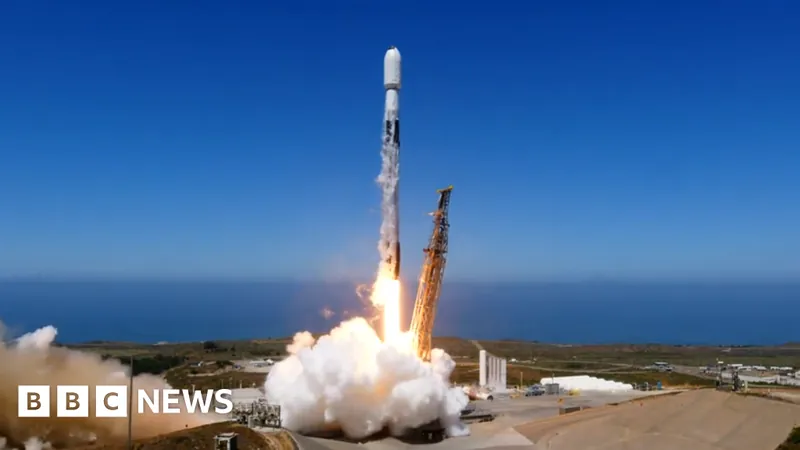
The African Space Race: Poised for a Galactic Breakthrough
2024-10-15
Author: Yan
A Historic Launch
In a historic moment, a remarkable array of satellites soared into space on August 16, each equipped with advanced solar panels and technologies. Among the impressive 116 satellites launched from Earth that day was a groundbreaking project from Senegal: the GaindeSAT-1A. This small CubeSat marks Senegal’s inaugural venture into space, symbolizing a significant stride towards achieving "technological sovereignty," as proclaimed by the nation's president.
Changing Landscape of Satellite Launches
According to Kwaku Sumah, founder of Spacehubs Africa, the cost of satellite launches has drastically decreased, paving the way for smaller nations to join the global space arena. “The reduction in cost has opened the market up,” Sumah noted, suggesting that nations like Senegal can now leverage satellite technology for various applications, including earth observation and telecommunications.
The African Space Club
With this recent launch, Senegal joins an exclusive club, as 17 African countries have successfully placed over 60 satellites into orbit. Notably, Djibouti and Zimbabwe have also launched their first satellites in the past year. This burgeoning satellite activity comes at a critical time, as the continent anticipates dozens more satellites to be launched in the forthcoming years. However, it is important to note that Africa still lacks its own launch facilities, raising questions about autonomy in its space programs.
The Significance of Satellite Control
While Africa is making strides in establishing a presence in space, powerful nations are keenly observing this development as a means to assert influence. For many, having independence in satellite technology is not just about exploring the cosmos, but about empowering local communities with data essential for monitoring agriculture, disaster response, and telecommunications in remote areas.
Expert Insights on Satellite Necessity
“It's paramount for African nations to control their satellites,” Sumah further explains, emphasizing the necessity for indigenous data access. This shift in perspective aims to alleviate the historical reliance on technologies from foreign powers.
Challenges in Space Exploration
Drama unfolds in the space tech sector as some experts describe space exploration as an elite endeavor, marginalized from broader economic initiatives that can significantly affect ordinary lives. Jessie Ndaba, co-founder of South African space tech firm Astrofica Technologies, criticizes the focus on ambitious space exploration rather than addressing immediate challenges such as climate change, food security, and resource management.
Practical Applications of Satellite Technology
Sarah Kimani, of the Kenyan Meteorological Department, offers insights into how satellite technology is being put to practical use in monitoring severe weather, which has become increasingly erratic due to climate change. With the introduction of next-generation satellites, Kenya anticipates enhanced capabilities for tracking and predicting severe weather phenomena, which could save lives and protect property.
Dependency on Foreign Technology
The budding space programs across Africa often rely on foreign technology and expertise to build their satellite capabilities. However, as Temidayo Oniosun of Space in Africa notes, a lack of local infrastructure for returning scientists and engineers can hinder progress.
The Role of GaindeSAT-1A
Even Senegal's flagship satellite GaindeSAT-1A, while a significant national achievement, highlights the ongoing reliance on international partnerships, with its development supported by a French university and launched on a SpaceX rocket.
Bright Future Ahead
Yet, amidst challenges, the future of African space initiatives appears bright. There are nearly 80 satellites currently in development, and the region may soon play a pivotal role in global space activities. The potential revival of long-dormant infrastructure, such as the Luigi Broglio Space Center off the Kenyan coast, could position Africa as a crucial player in international space launches.
Collaboration and Innovation
As the collaboration between African nations, foreign powers, and technology firms evolves, it could lead to the emergence of a rich ecosystem of space-related innovation. Experts like Julie Klinger emphasize the need for new treaties and strategies to ensure safe cooperation in this expanding frontier.
Conclusion and Future Prospects
As the world watches, African nations are poised for a transformative leap into space. The rise in satellite activity signals not just a technological advancement but a path toward self-determination and empowerment for millions across the continent. Are we witnessing the dawn of a new space age for Africa? Buckle up, because the journey has only just begun!


 Brasil (PT)
Brasil (PT)
 Canada (EN)
Canada (EN)
 Chile (ES)
Chile (ES)
 España (ES)
España (ES)
 France (FR)
France (FR)
 Hong Kong (EN)
Hong Kong (EN)
 Italia (IT)
Italia (IT)
 日本 (JA)
日本 (JA)
 Magyarország (HU)
Magyarország (HU)
 Norge (NO)
Norge (NO)
 Polska (PL)
Polska (PL)
 Schweiz (DE)
Schweiz (DE)
 Singapore (EN)
Singapore (EN)
 Sverige (SV)
Sverige (SV)
 Suomi (FI)
Suomi (FI)
 Türkiye (TR)
Türkiye (TR)